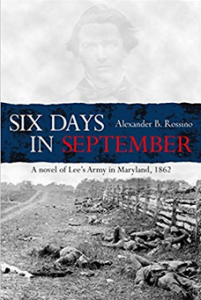Six Days in September: A Novel of Lee's Army in Maryland, 1862 by Alexander B. Rossino
Greetings all - I am about to take something of a different tack with this blog - and get back to my roots: historiography, popular history, memory, and teaching. As much as I love calling out the asinine in the world...I think there is enough of that out there to go around. So there you go. Let's kick things off with a review of a first-rate book: Six Days in September....
Alexander B. Rossino’s Six Days in September: A Novel of Lee’s Army in Maryland, 1862, paints a vivid picture of Robert E. Lee’s invasion of Maryland, which culminated in the bloody Battle of Antietam on September 17, 1862. Rossino captures the spirit of the Army of Northern Virginia, simultaneously depicting the events as they unfolded for the upper echelon of command, a number staff and field grade officers, and a handful enlisted soldiers as they maneuvered from South Mountain to Sharpsburg to slug it out (spoiler alert: unsuccessfully) with George B. McClellan and the Union Army of the Potomac.
I found the layered narrative to be especially engaging. The narrative style reminds the reader to take both a wide and narrow view of the military landscape. Rossino deftly lays out the grand strategy with Lee and his lieutenants and then refocuses his attention on the more personal exploits and adventures (as it were) of a Maryland Confederate officer and a group of Alabama enlisted men.
I was particularly satisfied with how Rossino chose to deal with the broader Civil War issue of slavery. Waters such as these are difficult to tread in a fictional recreation of a historic event. To simply sidestep the institution’s role in the cause of the war seems imprudent. And so an author might be tempted to resolve this problem by following one of two general paths: he or she might apologetically absolve the actors as people of their times or pander to a 21st century audience with cliché modernist critiques of the institution. By my estimation, both narrative courses are equally unwise. And thus I was relieved that Rossino chose neither. Instead, he is forthright about the issues that moved men to fight, including the Confederate preservation of slavery from a 19th century perspective.
Readers versed in Army of Northern Virginia lore will certainly be familiar with the strategic disputes between Lee and his most trusted lieutenant, James Longstreet. Rossino explores the tensions between these two, as well as others among the Confederate high command, in a way that foreshadows the more famous strategic disagreement between Lee and Longstreet at Gettysburg the following year. In ways similar to Michael Shaara’s The Killer Angels (1974), the Pulitzer Prize winning novel of the 1863 Gettysburg campaign, Six Days in September leaves the reader questioning Lee’s wisdom in Maryland that preceding autumn, challenging the notion of the peerless Lee. In Six Days, Lee is not without virtue, but he is clearly flawed as any mortal man tasked with such great responsibility might be.
After reading this thought-provoking, well-researched, and beautifully written novel, my only hope is that Rossino adds an additional layer (or layers) to the story by once again taking on the battle from the perspective of Lee’s adversaries: George B. McClellan and the men of the Army of the Potomac. McClellan makes only a peripheral appearance in Six Days, and only through a Confederate understanding of his cautiousness. I would personally love to see how Rossino would have McClellan act (or fail to act) when he finds himself in possession of the Lee’s famous “lost orders.” I would be equally intrigued by Rossino’s take on McClellan’s relationship with his commander in chief. These, of course, are hopes for the future. For now I am quite satisfied with Rossino’s novel – and I recommend it highly.
Buy the book HERE - and stay tuned, I'll be posting a lot more frequently in the days to come.
With compliments,
Keith

